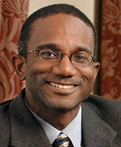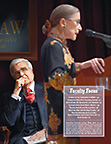Introducing Kevin Davis
Professor of Law
Printer Friendly VersionA widely published writer on issues relating to nonprofits, contracts and commercial law, and law and development, Kevin Davis joins the NYU School of Law as professor of law. He was formerly a tenured member of the faculty at the University of Toronto.
Davis received his B.A. in Economics from McGill University in 1990. After graduating with an LL.B. from the University of Toronto in 1993, he served as Law Clerk to Justice John Sopinka of the Supreme Court of Canada and later as an associate in the corporate department of Torys, a well-known Canadian law firm.
Since receiving his LL.M. from Columbia University in 1996, Davis has traveled widely in pursuit of intellectual and educational goals. He began in familiar territory as an assistant professor at the University of Toronto, but soon journeyed to the University of Southern California Law School, where he was a visiting assistant professor and John M. Olin research fellow. After being tenured at the University of Toronto, Davis spent time as a visiting fellow at Cambridge University’s Clare Hall and as a visiting lecturer at the University of the West Indies in Jamaica. He came to the NYU School of Law as a visiting professor in 2003, and says he is delighted to spend more time in an educational environment that “has such a buzz about it.”
“A big part of the draw to NYU is the city,” he said. “The global dimension of the Law School is also very attractive. It’s just a really vibrant intellectual community.”
Davis is currently working on a book with University of Toronto colleague Michael Trebilcock, tentatively titled Law, Institutions and Development Reconsidered, which will top off the ten articles, five manuscripts, six essays, and five government agency and industry group reports he has already authored or coauthored since 1996. While he plans to continue this focus on law and development by looking at the English-speaking Caribbean and the theoretical aspects between law and social welfare, his interests do not stop there.
“I’ve typically been interested in topics on the boundary between commercial law and criminal law,” he said. “For example, the limits of commercial morality, and what should count as immorality or fraud in the commercial world.”
A passionate teacher, Davis tries to show his students not only “how to think like a lawyer and understand how to engage in legal reasoning,” but, beyond that, “to recognize that they don’t always have to take legal rules as given. Some rules vary across time and place; they’re malleable. I want my students to see that there’s room for debate around the margins, while still recognizing the boundaries.”
—

